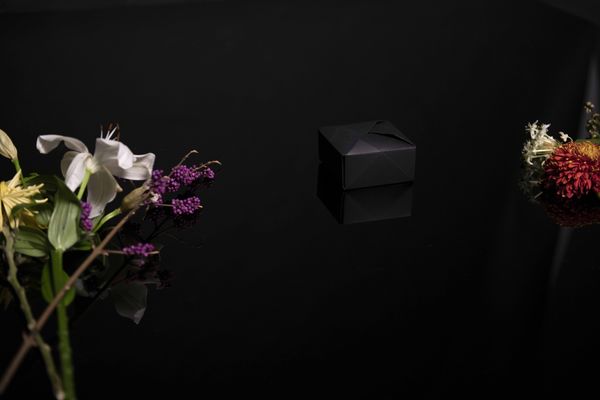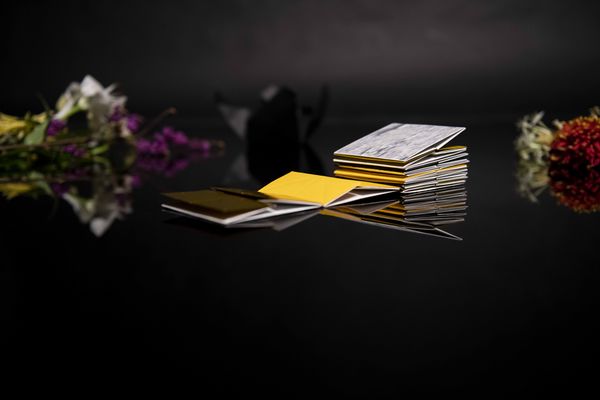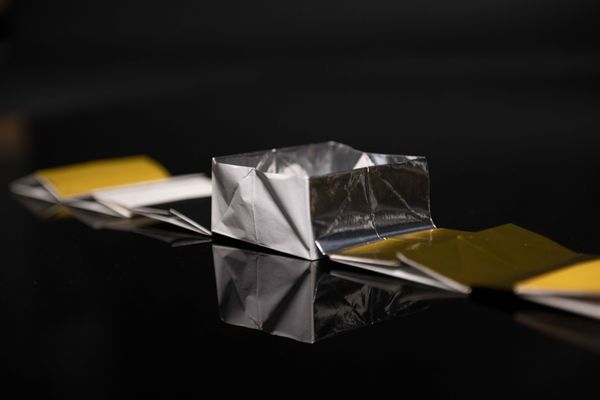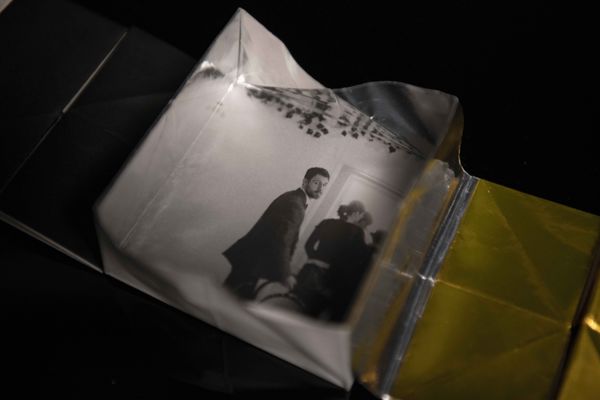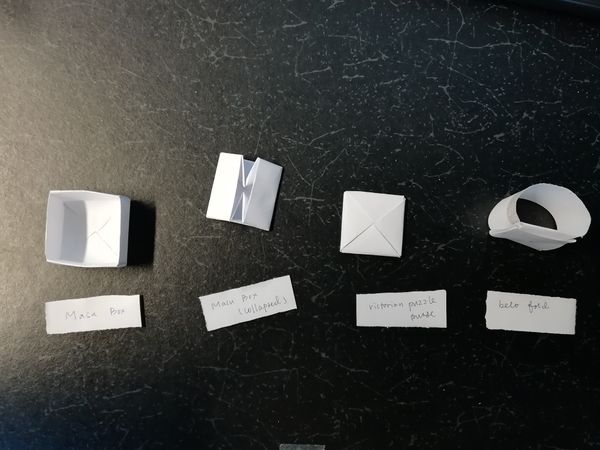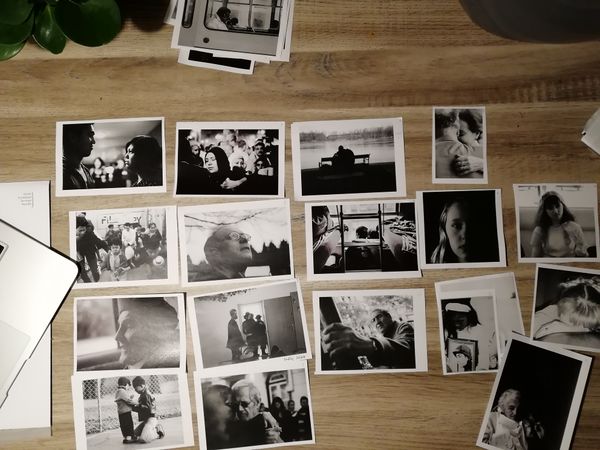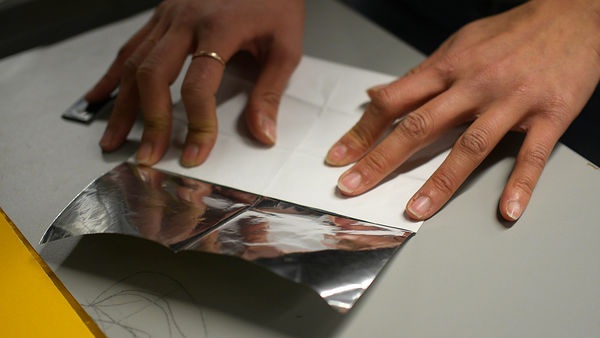|
|
| (26 intermediate revisions by the same user not shown) |
| Line 1: |
Line 1: |
| <div style="width:50%;"> | | <div style="width:600px; font-size:20px;"> |
|
| |
|
| = photobook presentation =
| | [[File:Fold-photobook1.jpg|600px]] |
|
| |
|
| == Holland: Magie van de Werkelijkheid ==
| | ''Fold'' is a book of the human moments surrounding loss, mourning, understanding and catharsis. It consists of twelve open-licensed photos selected from the myriad of images on Flickr. Each image rests in a square, collapsable origami module, with a palette associated with mourning rituals in certain cultures, including white, silver and earth. The photos follow a sequence, indicated by the book cover on the opposite side of each module. When assembled, the cover reads as one strip of folded sediments from a mountain, an image modified from a photo selected from Flickr as well. The book folds into a cuboid measuring 9 x 9 x 4.5cm and is placed in a container with credits of the image sources. |
|
| |
|
| [[File:Screen Shot 2018-11-07 at 17.33.00.png|400px]] | | [[File:Fold-photobook3.jpg|600px]] |
|
| |
|
| ISBN 90 274 9801 6
| | [[File:Fold-photobook6.jpg|600px]] |
|
| |
|
| © 1980 by Het Spectrum B.V. [http://www.unieboekspectrum.nl/pagina/over-ons]
| | How can one respect a book through one's interactions with it? I started the book with this question, which led to my decision for a book structure that allowed the development of a ritual: through (un)folding, opening and closing. Experimenting with ''origami'' (Japanese) and ''zhezhi'' (Chinese), I arrived at the final configuration. The form gave substance to the subject I had in mind: human emotions, whether voluntarily expressed or deliberately hidden. Folding evoked concealment, denial and deception while unfolding: truth, awareness and reconciliation. I focused on the emotion of grief because of my strong personal association with it and the depth of empathy I believed it was capable of elicit. The search terms I used including ''sadness'', ''death'', ''sorrow''. As I looked closely at the results on my screen, I found myself drawn to moments that revealed insight through what was unsaid (and which I regarded as cinematic). One image I encountered early in the process — of a man, holding a baby basket and looking back at the room his family was leaving, and captioned "Last Funeral, vol.2" spoke to me with its intimacy. It influenced my choices for other photos in the sequence. |
|
| |
|
| Printed in Italy
| | [[File:Fold-photobook5.jpg|600px]] |
|
| |
|
| Authors:
| | {{vimeo|304141499}} pwd is jue's pziwiki username :) |
| * Toon Fey (photographer)
| |
|
| |
|
| Geb. in 1946 te Utrecht. Fotografeerde aanvankelijk pop- en jazzmusici en allerlei evenmenten; maakte reizen naar verre landen en brengt veel tijd buiten door, vaak op het water, bijvoorbeeld in de Biesbosch, waar zijn broer vogelwachter is. Behalve daar fotografeert hij ook veel in het Waddengebied en bij de rivieren. Iemand die graag en intens om zich heen kijkt. Publiceerde en exposeerde in binnen- en buitenland.
| | I envision the book to be a part of an installation-performance. A performer will come on the stage, open the container and unfold the book. She will then invite the audience in line to come up and read the book closely by themselves. Video that creates the sense of a mourning site will be projected in the space. |
|
| |
|
| '''translation''': Photographed initially pop and jazz musicians and all kinds of events; traveled to distant lands and spent a lot of time outside, often on the water, for example in the Biesbosch, where his brother is a bird watcher. Except there, he also photographs a lot in the Wadden area and near the rivers. Someone who likes to look around intensely. Published and exhibited at home and abroad.
| | = process notes = |
|
| |
|
| * Martin Kers (photographer)
| | 1. |
|
| |
|
| Geb. in 1944 te Rijsoord, in de buurt van Rotterdam. Was eerst verbonden aan een reclamestudeio, trok zich daarna uit de reclame terug, verhuisde naar het rustige Friesland, fotografeerde daar veel en maakt als free-lancer illustraties voor boeken en tijdschriften.
| | folding and revealing |
|
| |
|
| '''translation''': Was first connected to a advertising studio, then withdrew from the advertising, moved to the quiet Friesland, photographed a lot there and makes free-lancer illustrations for books and magazines.
| | Eikoh Hosoe, '''Kammaitachi''' |
| | |
| * Frans Lanting (photographer)[https://en.wikipedia.org/wiki/Frans_Lanting]
| |
| | |
| Geb. in 1951 te Rotterdam. Voelt zich sterk aangetrokken tot oorspronkelijke Hollandse landschappen met waterkanten en open luchten, zoals de Wadden, de Delta en de Noordzeekust. Woont momenteel aan de westkust van de Verenigde Staten waar hij wekt als wetenschapper en natuurfotograaf
| |
| | |
| '''translation''': Feels strongly attracted to original Dutch landscapes with waterfronts and open skies, such as the Wadden, the Delta and the North Sea coast. Currently lives on the west coast of the United States where he awakens as a scientist and nature photographer
| |
| | |
| * Hans Bouma (text)
| |
| | |
| Geb. in 1941 te Tilburg, theoloog en dichter. Maakt zich in beide hoedanigheden al jaren zorgen ovr het niets-ontziende geweld, waarmee de mens natuur en milieu te lijf gaat. Pleit op allerlei manieren -- lezingen, colleges, preken, artikelen, boeken, gedichten -- voor wat Albert Schweitzer 'eerbied voor het leven' noemde.
| |
| | |
| '''translation''': theologian and poet. In both capacities, has for years been worried about the unscrupulous violence with which man attacks nature and the environment. Plead in many ways - lectures, lectures, sermons, articles, books, poems - for what Albert Schweitzer called 'reverence for life'.
| |
| | |
| * Henk Pen (foreword)
| |
| | |
| === text from the back ===
| |
| | |
| Het typisch Hollandse landschap is niet zo nuchter en prozaïsch als het doorgaans lijkt. Bij nader inzien, onder een bepaalde belichting, openbaart het zich als een fascinerende droomwereld, een wereld vol poëzie en mysterie. Een ándere dan de dagelijkse wereld, een visionaire wereld bijna, maar niettemin een wereld, die je herkent. Een wereld, die zich pas nu in al haar geheimzinnige glorie aan je onthult. Goed beschouwd tóch en nog steeds de dagelijkse wereld om je heen. Van die droomachtige en toch ook weer zo reële wereld van het Hollandse landschap willen de fotografen Toon Fey, Martin Kers en Frans Lanting in dit boek een beeld geven. Met korte, poëtische teksten laat Hans Bouma de verbeelding van hun foto's hoorbaar spreken. Met als motto 'Holland, magie van de werkelijkheid' vertelt dit boek het verhaal over een droom van een wereld, die voor de kijker/lezer pure wekelijkheid mag zijn.
| |
| | |
| '''translation'''
| |
| | |
| The typical Dutch landscape is not as sober and prosaic as it usually seems. On closer inspection, under a certain illumination, it reveals itself as a fascinating dream world, a world full of poetry and mystery. A different than the daily world, a visionary world almost, but nevertheless a world that you recognize. A world that only now reveals itself to you in all its mysterious glory. Well considered and still the daily world around you. The photographers Toon Fey, Martin Kers and Frans Lanting want to give a picture of that dreamlike and yet real world of the Dutch landscape in this book. With short, poetic texts Hans Bouma lets the imagination of their photos be heard audibly. With the motto 'Holland, magic of reality', this book tells the story of a dream of a world that may be pure reality for the viewer / reader.
| |
| | |
| === foreword/vormgeving ===
| |
| | |
| Dit nogal uitzonderlijke fotoboek is gebaseerd op het werk van drie jeugdige Nederlandse landschapsfotografen: Toon Fey, Martin Kers en Frans Lanting, de zich allen gespecialiseerd hebben in het fotografisch vastleggen van het Hollandse polderlandschap. Door gebruik te maken van ongewone weersomstandigheden (nevel, mist, regen, zeer laat of zeer vroeg licht), ongebruikelijke standplaatsen en technische hulpmiddelen (tele- en groothoeklenzen, technisch verouderde optiek in combinatie met moderne camera's, geforceerd filmmateriaal) slagen zij erin op dat polderlandschap een persoonlijke visie te geven, die zowel verrassend als vervreemdend werkt: het kost de beschouwer van hun kunst enige moeite in deze opnamen het Hollandse landshap, zoals hij zich dat uit eigen waarneming herinnert, te herkennen. Over vrijwel al deze foto's hangt een sfeer die dicht aanleunt tegen het magisch realisme van schilders als Carel Willink, Paul Delveaux, Pyke Koch en anderen, alsook van auteurs als de Vlaming Hubert Lampo. Opmerkelijk is ook, dat drie fotografen die tot voor kort geen enkel contact met elkaar hadden, op vrijwel dezelfde wijze het landschap hebben benaderd en gezocht hebben naar wegen om die benadering te visualiseren: een bewijs wellicht dat deze magisch-realistische opvatting in de lucht hing. Waarschijnlijk sluit hun fotografische visie aan op een veel algemenere hang naar een al dan niet vermeende werkelijkheid áchter de werkelijkheid. Wat dit fotoboek toont is 'het Hollandse landschap dat zich openbaart als een fascinerende droomwereld, een wereld vol poëzie en mysterie. Een andere dan de dagelijkse wereld, een visionaire wereld bijna, maar niettemin een wereld die je herkent. Een wereld die zich nu pas in al haar geheimzinnige glorie aan je onthult'. Het citaat is van de Utrechtse dichter-dominee Hans Bouma die voor dit bijzondere fotoboek de fijnzinnig-poëtische teksten heeft verzorgd.
| |
| | |
| '''translation (highlights are mine)'''
| |
| | |
| This rather exceptional photo book is based on the work of three young Dutch landscape photographers: Toon Fey, Martin Kers and Frans Lanting, all of whom have specialized in the photographic recording of the Dutch polder landscape. By <span style="background: #fd0;">using unusual weather conditions (mist, fog, rain, very late or very early light), unusual locations and technical aids (telephoto and wide-angle lenses, technically outdated optics in combination with modern cameras, forced film material) they succeed in polder landscape to give a personal vision</span>, which both surprisingly and alienating works: it takes the viewer of their art some effort in these shots to recognize the Dutch landscape, as he recalls from his own observation. Almost all of these photographs have an atmosphere that is close to the magical realism of painters such as <span style="background:#fd0;">Carel Willink, Paul Delveaux, Pyke Koch and others, as well as authors such as Fleming Hubert Lampo</span>. It is also remarkable that three photographers, who until recently had no contact with each other, approached the landscape in much the same way and searched for ways to visualize that approach: a proof that this magical-realistic view might have been in the air . Their photographic vision probably connects with a much more general tendency towards a reality, whether or not imagined, behind reality. What this photo book shows is' the Dutch landscape that reveals itself as a fascinating dream world, a world full of poetry and mystery. A world other than the daily world, almost a visionary world, but nevertheless a world that you recognize. A world that is now revealing itself to you in all its mysterious glory. " The quotation is from the Utrecht poet-reverend Hans Bouma who has created the subtle-poetic texts for this special photo book.
| |
| | |
| === context ===
| |
| | |
| Carel Willink: new realism = new objectivity + magic realism (the fearful 30's), deserted townscapes, dislocated animals[https://web.archive.org/web/20060909175848/http://www.tendreams.org/willink.htm]
| |
| | |
| === poetic text with the photo ===
| |
| | |
| Selected (see numbering on the stickers)
| |
| | |
| 1.
| |
| | |
| hoorbaar
| |
| | |
| wordt er hier geademd
| |
| | |
| | |
| er is van alles op til
| |
| | |
| | |
| maar het hoge woord
| |
| | |
| moet nog vallen
| |
| | |
| | |
| ik zwijg
| |
| | |
| houd mij adem in
| |
| | |
| | |
| '''translation'''
| |
| | |
| | |
| audible
| |
| | |
| is being breathed here
| |
| | |
| | |
| there is a lot of things going on
| |
| | |
| | |
| but the high word
| |
| | |
| has yet to fall
| |
| | |
| | |
| I'm silent
| |
| | |
| hold my breath
| |
|
| |
|
|
| |
|
| 2. | | 2. |
|
| |
|
| begin boven
| | folding as an action -- ritual |
|
| |
|
| met de woorden
| | folding as a metaphor -- layers, deception, unawareness -- unfolding truth |
| | |
| vóór op de tong
| |
| | |
| | |
| en leeś, lees
| |
| | |
| regel voor regel
| |
| | |
| mee ademend
| |
| | |
| met de wind --
| |
| | |
| | |
| dit nooit
| |
| | |
| uitgesproken
| |
| | |
| | |
| dit onuitsprekelijk
| |
| | |
| mooie gedicht
| |
| | |
| van de natuur
| |
| | |
| | |
| '''translation'''
| |
| | |
| | |
| start above
| |
| | |
| with the words
| |
| | |
| before on the tongue
| |
| | |
| | |
| and leeś, read
| |
| | |
| line by line
| |
| | |
| breathable
| |
| | |
| with the wind -
| |
| | |
| | |
| never do this
| |
| | |
| pronounced
| |
| | |
| | |
| this unspeakable
| |
| | |
| nice poem
| |
| | |
| from nature
| |
|
| |
|
|
| |
|
| 3. | | 3. |
|
| |
|
| hij verdween
| | folding as a form -- origami |
| | |
| even snel
| |
| | |
| als-ie kwam opdagen
| |
| | |
| | |
| zomaar
| |
| | |
| een gril een grap
| |
| | |
| van het leven
| |
| | |
| | |
| vreemde kronkel
| |
| | |
| gedachtenflits
| |
| | |
| | |
| watervlugge etude
| |
| | |
| | |
| '''translation'''
| |
| | |
| | |
| he disappeared
| |
| | |
| just as fast
| |
| | |
| as-he showed up
| |
| | |
| | |
| just like that
| |
| | |
| a quirk a joke
| |
| | |
| of life
| |
| | |
| | |
| strange twirl
| |
| | |
| thought flash
| |
| | |
|
| |
|
| watery etude
| | http://origamitutorials.com/origami-chinese-thread-book/ |
|
| |
|
|
| |
|
| 4. | | 4. |
|
| |
|
| als nooit tevoren
| | Chinese?? |
| | |
| zo subliem
| |
| | |
| zo extatisch
| |
| | |
| | |
| komt het wad
| |
| | |
| aan het licht
| |
| | |
| | |
| maar de schapen
| |
| | |
| grazen rustig door
| |
| | |
| | |
| als medespelers
| |
| | |
| insiders
| |
| | |
| | |
| té nauw bij
| |
| | |
| het mysterie betrokken
| |
| | |
| | |
| dat ze tijd hebben
| |
| | |
| om zich te verbazen
| |
| | |
| | |
| daar moet je
| |
| | |
| mens voor zijn
| |
| | |
| | |
| '''translation'''
| |
| | |
| | |
| as never before
| |
| | |
| so sublime
| |
| | |
| so ecstatic
| |
| | |
| | |
| comes the mudflats
| |
| | |
| to the light
| |
| | |
| | |
| but the sheep
| |
| | |
| graze quietly
| |
| | |
| | |
| as fellow players
| |
| | |
| insiders
| |
| | |
| | |
| too close
| |
| | |
| the mystery involved
| |
| | |
| | |
| that they have time
| |
| | |
| to be surprised
| |
| | |
| | |
| there you must
| |
| | |
| man for being
| |
| | |
| | |
| 5.
| |
| | |
| overeind gebleven
| |
| | |
| | |
| als enigen
| |
| | |
| nog op hun post --
| |
| | |
| | |
| en warempel
| |
| | |
| het lijkt er inderdaad op
| |
| | |
| | |
| dat ze het onheil
| |
| | |
| weten af te wenden
| |
| | |
| | |
| langzaam
| |
| | |
| wordt het lichter
| |
| | |
| | |
| '''translation'''
| |
| | |
| | |
| remained intact
| |
| | |
| | |
| as the only ones
| |
| | |
| still in their post -
| |
| | |
| | |
| and true
| |
| | |
| it indeed looks like it
| |
| | |
| | |
| that they are the mischief
| |
| | |
| know how to turn away
| |
| | |
| | |
| slowly
| |
| | |
| it becomes lighter
| |
| | |
| | |
| 6.
| |
| | |
| luid
| |
| | |
| bonsde haar hart
| |
| | |
| | |
| doodsangsten
| |
| | |
| stond ze uit
| |
| | |
| | |
| maar het moest
| |
| | |
| het was geboden
| |
| | |
| | |
| vervoerd
| |
| | |
| haastte zij zich weg
| |
| | |
| | |
| de daad
| |
| | |
| was gesteld
| |
| | |
| | |
| '''translation'''
| |
| | |
| | |
| loud
| |
| | |
| her heart pounded
| |
| | |
| | |
| mortal fears
| |
| | |
| she stood out
| |
| | |
| | |
| but it had to
| |
| | |
| it was required
| |
| | |
| | |
| transported
| |
| | |
| she hurried away
| |
| | |
| | |
| the deed
| |
| | |
| was asked
| |
| | |
| | |
| 7.
| |
| | |
| zomaar een lijn
| |
| | |
| willekeurig getrokken
| |
| | |
| | |
| en mijn horizon
| |
| | |
| ligt vast
| |
| | |
| | |
| dit is het dus
| |
| | |
| | |
| mijn blikveld
| |
| | |
| mijn wereld
| |
| | |
| | |
| '''translation'''
| |
| | |
| | |
| just a line
| |
| | |
| randomly drawn
| |
| | |
| | |
| and my horizon
| |
| | |
| is fixed
| |
| | |
| | |
| this is it
| |
| | |
| | |
| my vision
| |
| | |
| my world
| |
| | |
| | |
| 8.
| |
| | |
| als de stukjes
| |
| | |
| van een puzzel
| |
| | |
| | |
| maar waarom wil ik
| |
| | |
| ze nu in elkaar schuiven
| |
| | |
| er een geheel van maken?
| |
| | |
| | |
| alsof de puzzel
| |
| | |
| juist zo niet af
| |
| | |
| | |
| het beeld juist zo
| |
| | |
| niet compleet was
| |
| | |
| | |
| '''translation'''
| |
| | |
| | |
| like the pieces
| |
| | |
| of a puzzle
| |
| | |
| | |
| but why do I want to
| |
| | |
| they now slide together
| |
| | |
| to make it a whole?
| |
| | |
| | |
| as if the puzzle
| |
| | |
| just so not finished
| |
| | |
| | |
| the picture just like that
| |
| | |
| was not complete
| |
| | |
| | |
| 9.
| |
| | |
| zoals die bomen elkaar
| |
| | |
| met raad en daad bijstaan
| |
| | |
| | |
| schouder aan schouder leven
| |
| | |
| solidair
| |
| | |
| stamverwanten
| |
| | |
| | |
| in weer en wind
| |
| | |
| hun broederschap belijdend --
| |
| | |
| | |
| om jaloers op te zijn
| |
| | |
| | |
| '''translation'''
| |
| | |
| | |
| like those trees together
| |
| | |
| assist with advice and action
| |
| | |
| | |
| to live shoulder to shoulder
| |
| | |
| solidarity
| |
| | |
| relatives
| |
| | |
| | |
| in wind and weather
| |
| | |
| confessing their brotherhood -
| |
| | |
| | |
| to be jealous of
| |
| | |
| | |
| 10.
| |
| | |
| aangespoeld
| |
| | |
| het is voorbij
| |
| | |
| | |
| voorbij?
| |
| | |
| | |
| zo weergaloos
| |
| | |
| stervend
| |
| | |
| | |
| is sterven
| |
| | |
| geen sterven meer
| |
| | |
| | |
| '''translation'''
| |
| | |
| | |
| washed ashore
| |
| | |
| it is over
| |
| | |
| | |
| pass?
| |
| | |
| | |
| so unparalleled
| |
| | |
| dying
| |
| | |
| | |
| is dying
| |
| | |
| no more dying
| |
| | |
| | |
| sample (between 7 & 8)
| |
| | |
| | |
| opgaand
| |
| | |
| in hun gegraas
| |
| | |
| | |
| horen ze niets
| |
| | |
| van het geraas
| |
| | |
| van de trein
| |
| | |
| | |
| vroeger
| |
| | |
| schrokken ze nog
| |
| | |
| | |
| maar nu zijn ze
| |
| | |
| wel wijzer
| |
| | |
| | |
| een trein is maar
| |
| | |
| iets voorbijgaands
| |
| | |
| | |
| gras daarentegen
| |
| | |
| iets blijvends
| |
| | |
| | |
| '''translation'''
| |
| | |
| | |
| ascending
| |
| | |
| in their grains
| |
| | |
| | |
| they hear nothing
| |
| | |
| from the roar
| |
| | |
| from the train
| |
| | |
| | |
| back in the days
| |
| | |
| they were still shocked
| |
| | |
| | |
| but now they are
| |
|
| |
|
| well wise
| | esoteric history, thread book in SW China [http://www.sohu.com/a/209785918_698884] |
|
| |
|
| | esoteric history 2, froebelian (what a word) influence of Chinese folding books [http://foldingdidactics.com/history/a-history-of-chinese-paper-folding-books-and-their-froebelian-influence/] |
|
| |
|
| a train is only
| | appropriating forms... |
|
| |
|
| something out of the ordinary
| | encounters of the past (whatever that is) through internet... |
|
| |
|
| | [[File:Fold-process0.jpg|600px]] |
|
| |
|
| grass, by contrast
| | [[File:Fold-process2.jpg|600px]] |
|
| |
|
| something permanent
| | [[FIle:In-the-folding1.jpg|600px]] |
|
| |
|
| == it would have been nice == | | = photobook presentation 13/11= |
|
| |
|
| [[File:51U7vxxgIaL. SX378 BO1,204,203,200 .jpg|400px]] | | See [[Jujube/holland-photobook-notes| this page]] |
|
| |
|
| I would have liked to present Border Film Project, a book from a larger project of participatory photography[http://www.borderfilmproject.com/en/background/], which I perused at Aeromoto in Mexico City. Unfortunately I couldn't find a copy immediately available in the Netherlands at the Fotomuseum Library.
| |
|
| |
|
| </div> | | </div> |

